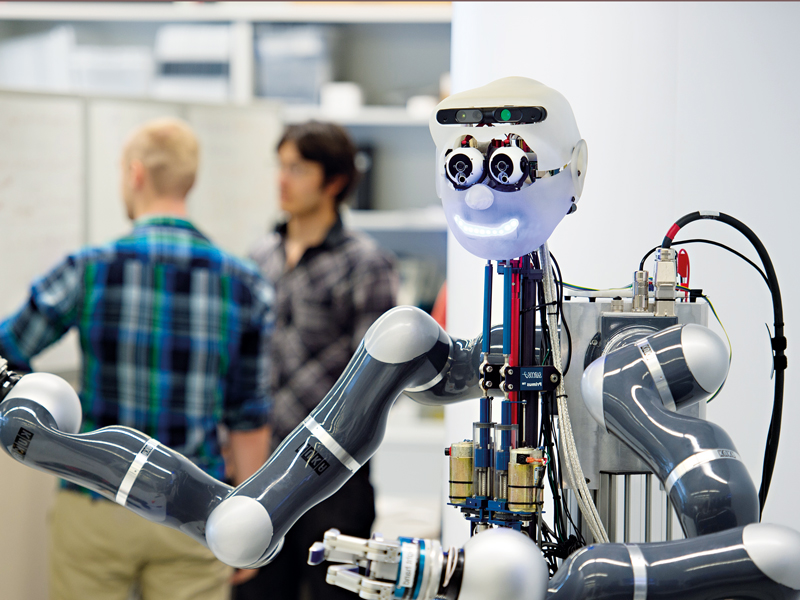Germany’s digital hubs are transforming Baden-Württemberg
Thanks to continued investment from the German Government, it’s never been easier for aspiring entrepreneurs to bring their dreams to life in Baden-Württemberg

Baden-Württemberg is swiftly becoming one of Europe’s leading investment and innovation centres, with more than 5,000 foreign companies having already based themselves in the state to benefit from its unique opportunities. This is especially the case in sectors focusing on artificial intelligence (AI) and studies into future mobility. Indeed, Baden-Württemberg excels in research and development – in 2017, research expenditure totalled €27.9bn ($30.6bn), or a sizable 5.6 percent of the state’s GDP.
Prior to 2016, there was a significant lack of digital investment and development in Germany, especially in rural areas. With criticism centred on this fact, Baden-Württemberg decided to launch a multi-disciplinary digitalisation strategy called digital@bw at the end of 2016. Around €1bn ($1.1bn) of investment was secured, with a plan for it to be delivered by 2021. Of this, €122m ($134m) was invested in more than 500 broadband projects in 2018.
Out of the 12 hubs within the nationwide Digital Hub Initiative (a network of innovation centres with specialised focuses), three are located in Baden-Württemberg: a future industries hub in Stuttgart, a digital chemistry and health hub in Mannheim, and an AI hub in Karlsruhe.
The south-western region has the highest industrial density in Germany and is known for its world-leading companies in the automotive sector
Innovative network
Baden-Württemberg’s Cyber Valley lies between the cities of Stuttgart and Tübingen. These cities have a strong heritage in research and education, are home to two renowned universities, and boast several research institutes. The south-western region has the highest industrial density in Germany, and is known for its world-leading companies in the automotive and engineering sectors, including Daimler, Bosch, SAP, Porsche and ZF Friedrichshafen.
Further, 10 independent research groups carry out fundamental research in the field of AI throughout Cyber Valley. Collectively, the groups research machine learning, computer vision and robotics. Researchers are specifically seeking novel numerical algorithms that will enable learning machines to process information faster and more reliably, as well as intelligent software for self-driven vehicles and smarter traffic-guidance systems.
It’s no surprise, then, that Baden-Württemberg has become a popular headquarters for tech start-ups and small and medium-sized enterprises (SMEs). The federated state offers not only an ideal ecosystem for aspiring firms, but also a strong industry base with an exciting mix of SMEs and multinationals – all of which are potential clients.
The Digital Hub Initiative is both recognition for the achievements of the past and a boost for the future. On the one hand, the label is an award for regions for their competence in their respective technological fields. It also helps to boost their respective strengths by supporting knowledge transfer and connecting established companies to innovation partners from both the scientific and start-up communities.

The future of industry
Baden-Württemberg has established itself as a vital base for the anticipated tech boom in AI technology, as well as a key player in the integration of AI within the transport sector. For example, the Active Research Environment for the Next Generation of Automobile (ARENA2036) programme, which is located in the region, continues to revolutionise the automotive industry.
Set up on the campus of the University of Stuttgart as a factory of the future, ARENA2036 allows onsite testing of research findings from the manufacturing and development sectors. In particular, it focuses on integrated lightweight and innovative manufacturing technology, and benefits from close links to start-up Autobahn, a business accelerator for start-up companies working on hardware or software-based mobility solutions. In 2036, the programme will celebrate the 150th anniversary of the invention of the automobile in Baden-Württemberg by Karl Benz.
Opening Baden-Württemberg up to foreign markets and highlighting the region as a global leader for industry, business and science have always been the core aspects of our mission. The work we do at Baden-Württemberg International aims to secure and strengthen the position of the state over the long term by encouraging foreign capital investment, helping companies to settle and promoting cooperation between businesses and cutting-edge research.













